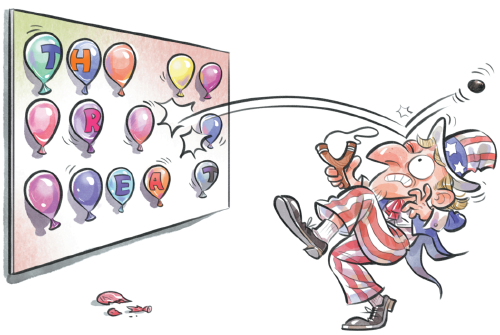Biden's balloon busting could boomerang

Li Min/China Daily
Last Thursday, almost a fortnight after the US Air Force shot down a Chinese balloon on Feb 4, President Joe Biden finally broke his silence. Earlier, the balloon had been hovering over North American skies, and making media headlines, for almost a week.
Biden's prolonged and deafening silence was, of course, accompanied by actions such as United States Secretary of State Antony Blinken postponing his visit to China. Then the US House of Representatives passed a resolution, with an unprecedented 419 to 0 majority, condemning China for its "brazen violation of US sovereignty." And then, as a final punch, the US Air Force shot down three more flying objects over North America, at first describing them as national security threats.
The Biden administration even claimed that China had sent similar surveillance balloons over the skies of many other countries but gave no details whatsoever; sending its friends and allies to stare into their home skies anxiously. Australian leaders were reportedly reaching out to their American counterparts and openly questioning their own intelligence agencies.
But after Biden spoke to NBC television on Thursday, his explanation — which has since become the refrain of all other US leaders, including Vice-President Kamala Harris who spoke at the Munich Security Conference on Friday — has only further diminished the credibility of US agencies.
For instance, days after US agencies retrieved debris from the balloon they had shot down, all Biden had to say about the three other flying objects that were shot down was: "We don't yet know exactly what these three objects were, but nothing right now suggests they were related to China's spy balloon program, or they were surveillance vehicles from any other country."
While trying to play down the incident, he even suggested that the three flying objects may have been part of some academic research, corporate endeavor or even recreational activity, though no one has as yet claimed ownership. An American hobby club — Northern Illinois Bottlecap Balloon Brigade — however, claims to have lost one of its balloons that has circled the earth seven times, only reinforcing the Chinese argument that US balloons have also been flying over Chinese skies.
To defuse the crisis, President Biden said he will soon talk to Chinese leader on the issue, though he didn't give any timeline. He also tried to reassure his constituents at home by saying he has directed his team to come back to him with much sharper rules on how to deal with these flying objects; to be able to distinguish between those posing safety and security threats, necessitating action, and those that do not. He also sought to reassure his friends and allies by pledging to work for streamlining global norms for dealing with such exigencies.
There, however, remain major loopholes that must be plugged so as not to fall prey to similar knee-jerk responses involving the world's most powerful military machine. As a first thing, reflecting on US agencies, this presidential explanation was not much different from earlier US briefings that saw officials parroting the much rehearsed "we do not know" or "this is not our domain" officialese, pushing the media into speculating about aliens infesting US skies and US generals not ruling out that possibility.
Second, and more specifically, it is worrying that North America's binational North American Aerospace Defence Command or Norad's, jointly manned by Canada and the US, stands exposed for its inability to even identify small slow-moving airborne objects over its skies. Also, the way that they precipitously chose to declare these as threats to national security and destroy them before even identifying them must send shivers down the spines of those who rely on the US military or even US military technology.
What makes it particularly perplexing is that Norad had only recently undergone modernization costing billions of dollars and this involved recalibrating its radar systems to detect such objects in the skies. Last June, Canada alone had pledged to invest $40 billion for Norad's modernization over the coming two decades, thereby linking its future security to US military partnership.
According to experts, weather forecast radar systems have become so advanced that they can determine the shape of a 6-milimeter raindrop from more than 8 miles away, and yet Norad could not identify these much hyped slow-moving flying objects in its skies. While all this has implications for the security of the US and its allies and adversaries alike, with the onset of presidential primaries — where President Biden has announced his desire to contest for a second innings — such fiascos could also challenge his contest for the presidency.
The author is professor of international relations at Jawaharlal Nehru University (New Delhi) currently visiting professor with University of British Columbia (Vancouver).
Photos
Related Stories
- US 'top disrupter' of global order, FM spokesman says
- US reconnaissance on China
- US military uses balloons, disguises recon aircraft as civilian planes to spy on China: report
- Beijing rejects Washington arms claims
- China-U.S. relations should not be led astray by a wandering balloon: Chinese envoy
- Commentary: Competition should not be the leitmotif of China-U.S. ties
- China urges U.S. not to use unmanned airship for political manipulation
- More needs to be done to prepare for chip war
- China vows to take countermeasures after US unveils blacklist
- US urged to reflect on China-US relations, correct wrongdoings over balloon incident
Copyright © 2023 People's Daily Online. All Rights Reserved.









